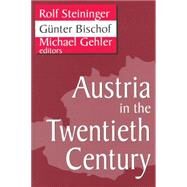Austria in the Twentieth Century
, by Bischof,Gunter- ISBN: 9781412808545 | 1412808545
- Cover: Nonspecific Binding
- Copyright: 12/15/2008
The fourteen essays in this volume include works by leading Austrian historians and political scientists. Collectively it serves as a basic introduction to a small but trend-setting European country. It is also a basic up-to-date outline of Austria's political history, shedding light on economic and social trends as well. No European country has experienced more dramatic turning points in its twentieth-century history than Austria. This volume divides the century into three periods. Section I deals with the years 1900-1938. The First Austrian Republic (established in the aftermath of World War I) was one of the succession states that tried to build a nation against the backdrop of political and economic crisis and a simmering civil war. Democracy collapsed in 1933 and an authoritarian regime attempted to prevail against pressures from Nazi Germany and Nazis at home. Section II covers World War II. In 1938, Hitler's "Third Reich" annexed Austria and the population was pulled into the cauldron of World War II fighting and collaborating with the Nazis, and also resisting and fleeing them. Section III concentrates on the Second Republic (1945 to the present). After ten years of four-power Allied occupation, Austria regained her sovereignty with the Austrian State Treaty of 1955. The price paid was neutrality. Unlike the turmoil of the prewar years after 1955, Austria became a "normal" nation with a functioning democracy, one building toward economic prosperity. After the collapse of the "iron curtain" in 1989, Austria turned westward, joining the European Union in 1995. Most recently, with the advent of populist politics, Austria's political system has experienced a sea of change, departing from its political economy of a huge state-owned sector and social partnership. This insightful volume will serve as a textbook in courses on Austrian, German and European history, as well as in comparative European politics.







